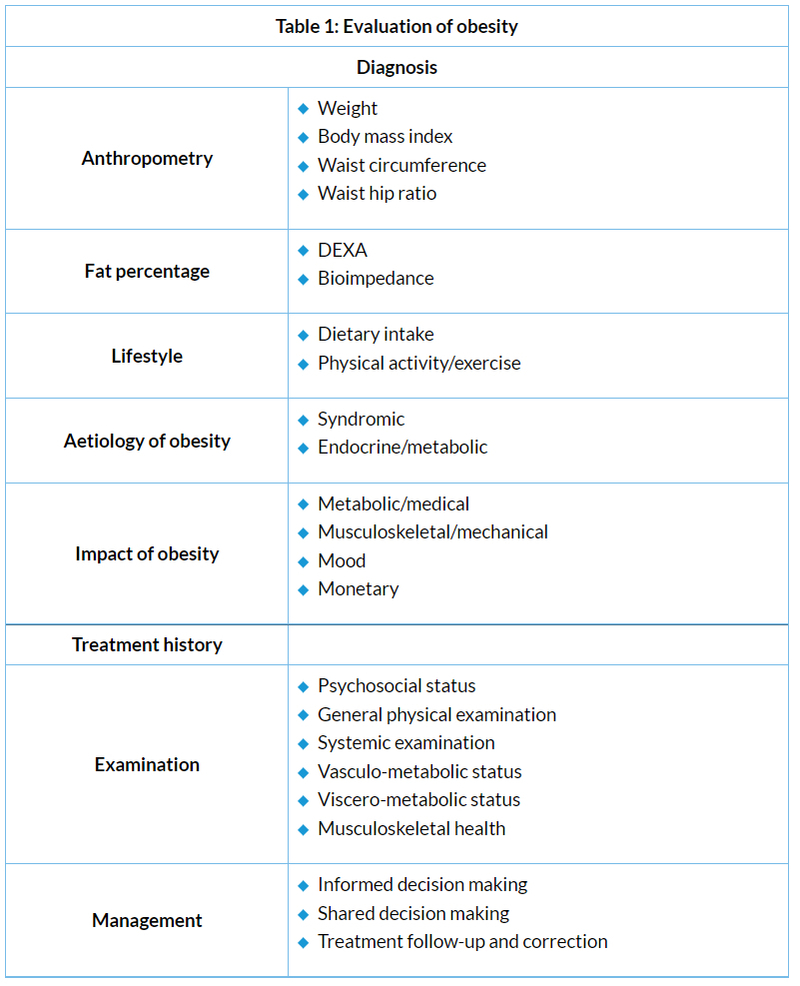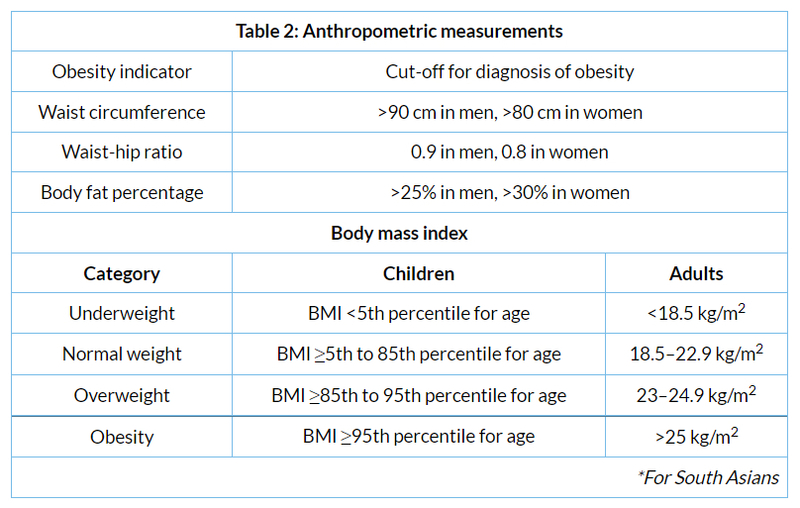Pharmacological interventions for obesity: Dr. Sanjay Kalra
M3 India Newsdesk Aug 04, 2021
Obesity has been recognised and defined as a disease in many countries across the world. This acknowledgement, however, has not been accompanied by a proactive attitude to its diagnosis and management in clinical practice. In this write-up, Dr. Sanjay Kalra shares a pragmatic approach to obesity care, listing the steps in approach.
Ask and assess
Measure the weight and body mass index of every patient you interact with. If indicated, do measure the waist circumference and waist-hip ratio if possible. Once obesity or overweight are diagnosed, inform your patient and ask if he/she wishes to evaluate this further (Table 1).

The normal values for various anthropometric measurements are listed in Table 2.

Explore and evaluate
Make a detailed evaluation, including dietary intake, physical activity, endocrine, metabolic, medical and treatment history. Understand the aetiology of obesity, its impact on quality of life, and possible barriers to management. Having a qualified medical nutrition specialist is helpful in ensuring quality services.
Investigate and introspect
Based upon clinical findings, suggest investigations to understand the possible aetiology of obesity, its complications and comorbid conditions. The metabolic, musculoskeletal, mood-related and monetary impact of obesity must be defined. Focus on associated dysmetabolism, including diabetes, hypertension, dyslipidaemia, heart disease, obstructive sleep apnoea, non-alcoholic fatty liver disease and polycystic ovary syndrome. “Mechanical” dysfunction such as osteoarthritis of the knees and mood disorders like anxiety and depression must be assessed. The possible effect of obesity, and its management, on socioeconomic health should be a focus of introspection as well.
Options and opportunities
Obesity is a chronic disease, and obesity management is a long-term process. A comprehensive evaluation of the individual should be followed by a process of shared and informed decision making. Offer various options for management, discussing their pros and cons. Medical nutrition therapy, orlistat, liraglutide and surgical options must be evaluated. Explore potential opportunities for motivation, and for the involvement of friends and family members.
Understanding and umbrella approach
Obesity management should be offered as part of overall healthcare. Comprehensive lifestyle and medical care are needed as well as counselling for surgery, if needed, as a unified” umbrella” under a single roof. This should be accompanied by understanding and empathy for the psychosocial challenges of living with and tackling obesity.
Obesity management includes lifestyle and dietary modification, backed by intensive behavioural therapy. Low and very low-calorie diets are used to manage obesity but are difficult to sustain. Similarly, fad diets such as the keto diet are associated with multiple side effects and poor adherence.
Pharmacological options in India include orlistat and liraglutide. Orlistat inhibits the absorption of dietary fat, while liraglutide, which is a glucagon-like peptide 1 receptor agonist, restricts caloric intake and enhances energy expenditure. Bariatric surgery is another option for severe obesity.
Starting an obesity clinic
Obesity management is an important field of medicine. To start an obesity care centre, one needs to equip oneself with the required hard (science) as well as soft skills (art) of medicine. Teamwork is essential. In case one is not able to have all specialists (nutritionist, psychologist, exercise physiologist) in one clinic, digital therapeutic platforms can provide comprehensive support. There should be management pathways in place for referral to allied specialities if needed.
An obesity clinic should be structured in such a way as to be accessible to, and comfortable for, obese persons. Suitable chairs, couches, weighing machines, body composition tools, large-sized measuring tapes and blood pressure cuffs must be available. Visual aids and other teaching material should be used to explain therapeutic rationale and plans.
It is noteworthy that obesity is a chronic disease, and that long term management will be required for the condition. The bariatric physician should be well versed with the caveats and concerns related to chronic disease care. It must also be emphasised that obesity is a multifaceted syndrome, with biomedical, psychological and social components: a thorough understanding of the biopsychosocial model of health is mandatory before starting obesity care services.
Obesity management
Obesity is a growing epidemic that needs to be tackled. Its multifaceted aetiopathogenesis and clinical impact call for a multipronged approach to its treatment. The first steps, however, are to acknowledge obesity as a disease, assess for obesity in all patients, and arrive at an agreement with affected individuals (and their families) for management.
Disclaimer- The views and opinions expressed in the article and videos are those of the speakers and do not necessarily reflect the official policy or position of M3 India.
The author, Dr. Sanjay Kalra is a leading Endocrinologist from India.
-
Exclusive Write-ups & Webinars by KOLs
-
Daily Quiz by specialty
-
Paid Market Research Surveys
-
Case discussions, News & Journals' summaries